
As the United Nations marks its 80th anniversary in 2025, this report by the Department of Economic and Social Affairs (UN DESA) traces the evolution of sustainable development within the UN system. It highlights the organization’s role in shaping both the understanding and the practical application of sustainable development.

The UN DESA Annual Highlights report is a tool to communicate the contributions of the Department to the realization of internationally agreed development goals and shared social, economic, and environmental aspirations. It showcases the Department’s role in gauging trends, building capacities, and shaping solutions. UN DESA Highlights 2025 covers activities over the period of the 79th Session of the General Assembly (September 2024 – August 2025) and reflects the Department’s response to the set priorities and expressed needs of Member States. Seven (7) thematic chapters showcase how UN DESA put its expertise to the task of supporting Member State efforts to implement the 2030 Agenda…
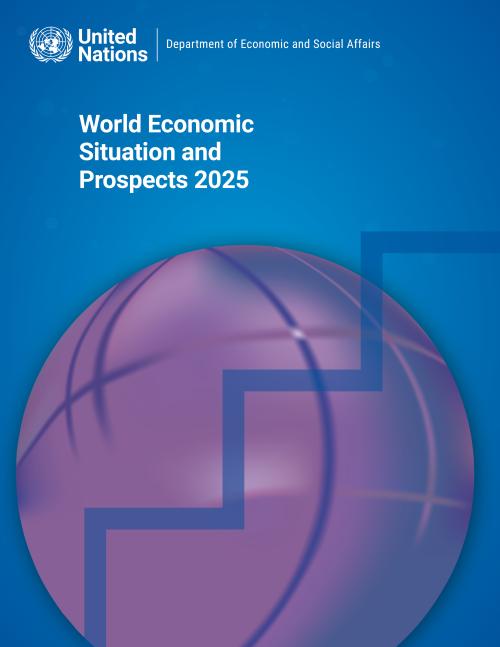
Global economic growth is projected to remain at 2.8 per cent in 2025, unchanged from 2024, according to the United Nations flagship report, World Economic Situation and Prospects (WESP) 2025. While the global economy has demonstrated resilience, withstanding a series of mutually reinforcing shocks, growth remains below the pre-pandemic average of 3.2 per cent, constrained by weak investment, sluggish productivity growth, and high debt levels.
The report notes that lower inflation and ongoing monetary easing in many economies could provide a modest boost to global economic activity in 2025. However, uncertainty still looms large, with risks stemming from geopolitical conflicts,…
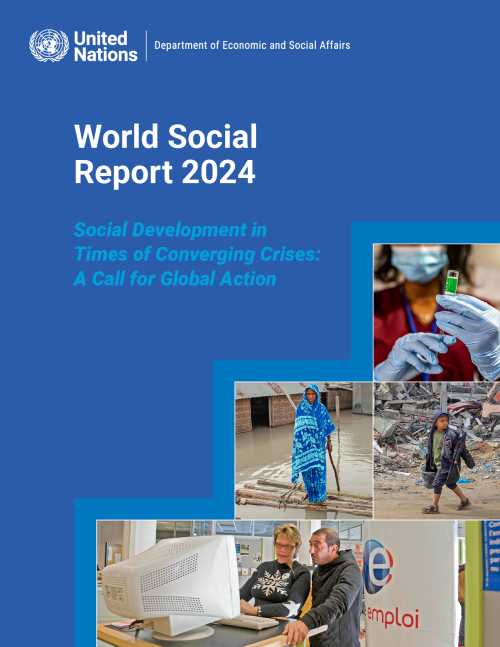
According to the World Social Report 2024, urgent global action is needed to support national efforts to address the setbacks caused by the recent global crises, and to avoid the conversion of future shocks to crises.
Titled “Social Development in Times of Converging Crises: A Call for Global Action”, the World Social Report 2024 explains that, in our current global policy environment, shocks more readily turn into crises that cross boundaries, demanding international action. Particularly as such crises disproportionately impact the most vulnerable people, societies and countries.
Crisis-driven setbacks in poverty reduction and unemployment
Successive shocks,…
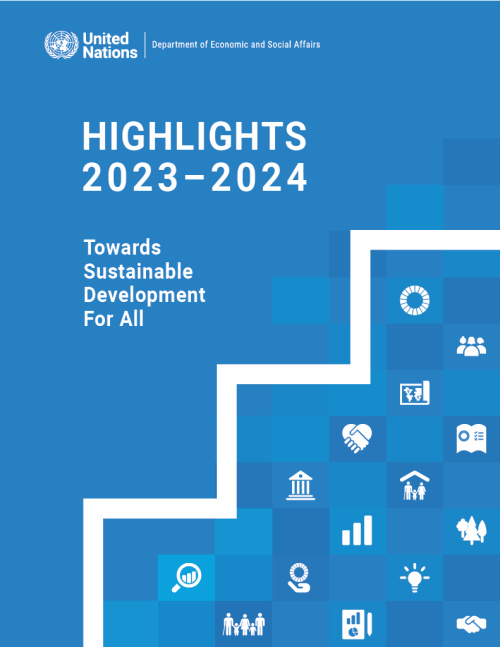
The UN DESA Annual Highlights report is a tool to communicate the contributions of the Department to the realization of internationally agreed development goals and shared social, economic, and environmental aspirations. It showcases the Department’s role in gauging trends, building capacities, and shaping solutions. UN DESA Highlights 2023–2024 covers activities over the period of the 78th Session of the General Assembly (September 2023 – August 2024) and reflects the Department’s response to the set priorities and expressed needs of Member States. Seven (7) thematic chapters showcase how UN DESA put its expertise to the task of supporting Member State efforts to implement the 2030…
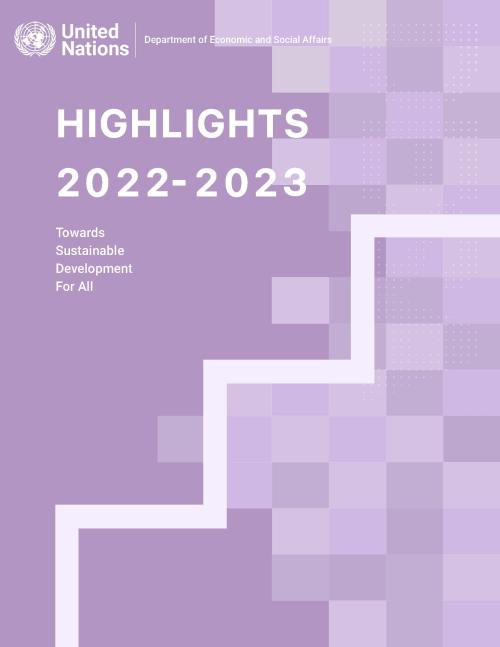
The UN DESA Annual Highlights report is a tool to communicate the contributions of the Department to the realization of internationally agreed development goals and shared social, economic, and environmental aspirations. It showcases the Department’s role in gauging trends, building capacities, and shaping solutions. UN DESA Highlights 2022-2023 covers activities over the period of the 77th Session of the General Assembly (September 2022 – August 2023) and reflects the Department’s response to the set priorities and expressed needs of Member States. Seven (7) thematic chapters showcase how UN DESA put its expertise to the task of supporting Member State efforts to implement the 2030…
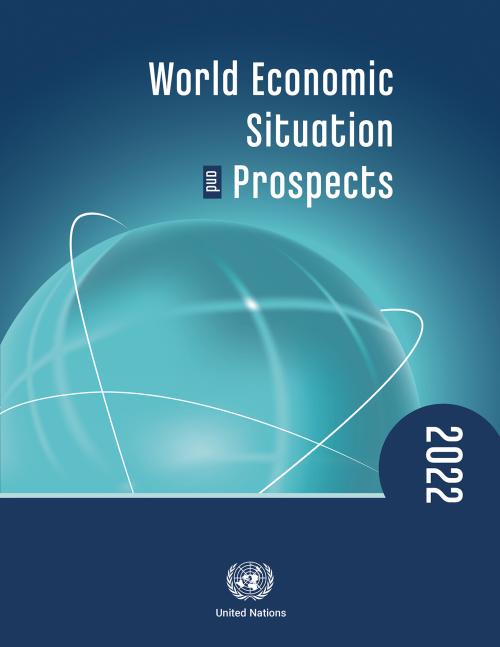
Global growth prospects have weakened significantly amid the war in Ukraine, rising energy, food and commodity prices, soaring inflation and tightening monetary policy stances by major central banks. The world economy is projected to grow by 3.1 per cent in 2022, marking a downward revision of 0.9 percentage points from our previous forecast released in January 2022. The baseline forecast faces significant downside risks from further intensification of the war in Ukraine and potential new waves of the pandemic.
Growth forecasts for the United States, European Union and China have been revised downward, with the European Union registering the most significant downward revision. The…
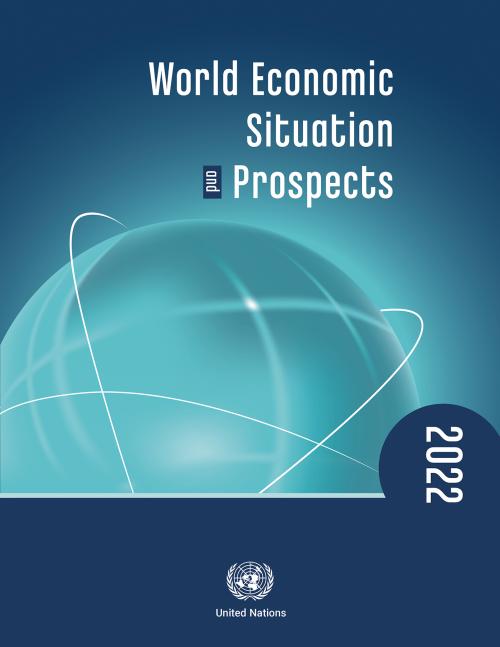
The global economic recovery is facing significant headwinds amid new waves of COVID-19 infections, persistent labour market challenges, lingering supply-chain challenes and rising inflationary pressures. After expanding by 5.5 per cent in 2021, the global output is projected to grow by only 4.0 per cent in 2022 and 3.5 per cent in 2023, according to the United Nations World Economic Situation and Prospects (WESP) 2022.
The robust recovery in 2021 – driven by strong consumer spending and some uptake in investment, with trade in goods surpassing pre-pandemic levels — marked the highest growth rate in more than four decades, the Report highlighted. Yet the momentum for growth –…
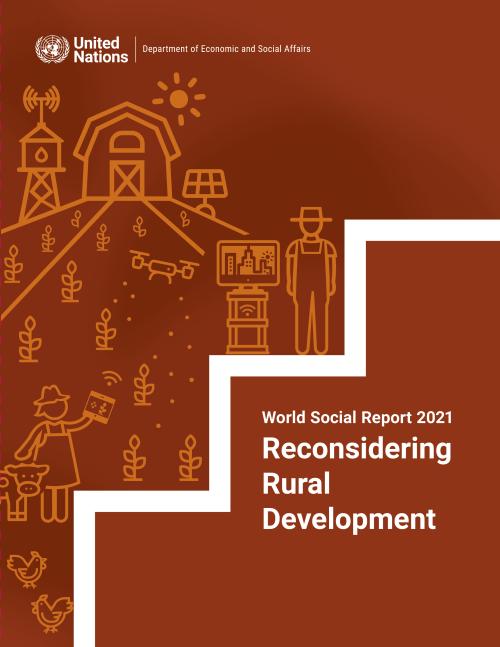
New approaches made possible through improved access and Internet connectivity can raise the standard of living for approximately 3.4 billion people living in rural areas, without them having to migrate to cities, according to the newly released 2021 World Social Report “Reconsidering Rural Development.”
The COVID-19 pandemic, together with already persistent high levels of poverty and inequalities, are threatening to stall progress for the world’s rural populations. But the pandemic has also proven that new technologies can enable rural populations to flourish, ending the rural-urban divide.
UN Secretary-General António Guterres said the new technologies opened up new…
The new report examines five megatrends: climate change; demographic shifts, particularly population ageing; urbanization; the emergence of digital technologies; and inequalities –that are affecting economic, social and environmental outcomes. Efforts to reverse or redirect these trends must be reinforced to ensure that we achieve the full measure of the 2030 Agenda, and set the stage for an inclusive, sustainable and equitable future during the next 75 years.
All trends are the result of human activity, and as such, they can be shaped by human decisions and policy choices. By making the right choices today, without further delay, it is not too late to shape the major trends of…
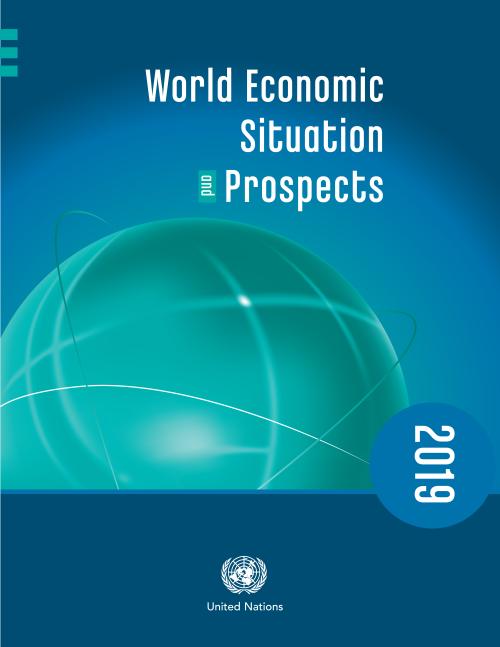
The global economy will continue to grow at a steady pace of around 3 per cent in 2019 and 2020 amid signs that global growth has peaked. However, a worrisome combination of development challenges could further undermine growth, according to the United Nations World Economic Situation and Prospects (WESP) 2019.
UN Secretary-General António Guterres cautioned “While global economic indicators remain largely favourable, they do not tell the whole story.” He said the World Economic Situation and Prospects 2019 “raises concerns over the sustainability of global economic growth in the face of rising financial, social and environmental challenges.”
Global growth is expected to…
Evidence is increasing that climate change is taking the largest toll on poor and vulnerable people, and these impacts are largely caused by inequalities that increase the risks from climate hazards, according to a new report launched by the United Nations today.
The World Economic and Social Survey 2016: Climate Change Resilience—an Opportunity for Reducing Inequalities (#WESS2016), found that governments can play a significant role in reducing the risks of climate change to vulnerable populations. Through transformative policies, the report shows that governments could address the root causes of inequalities and build climate change resilience.
While there is…
 Welcome to the United Nations
Welcome to the United Nations